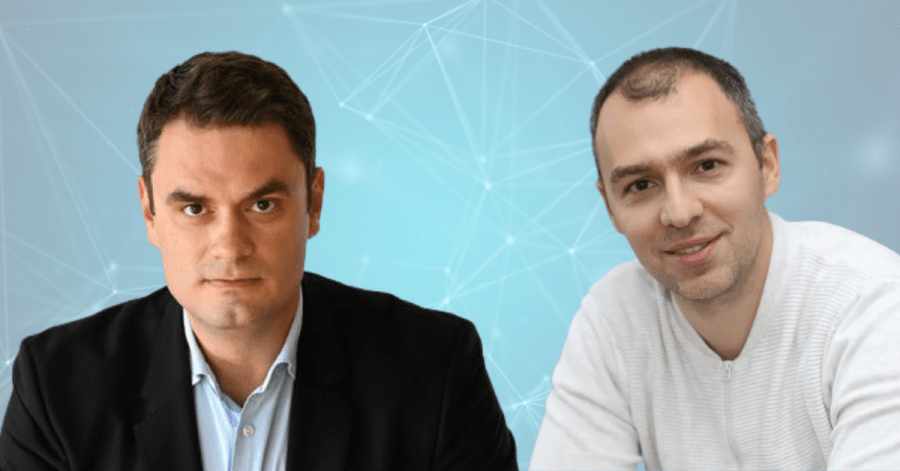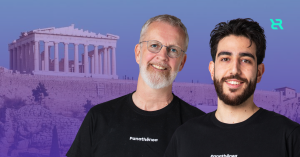What is the story of the Balkans? A region with a complex history and a murky reputation? Or a region with great tech talent and potential to become the beacon of technology and innovation in Europe in the next 20 years?
This is the central question at the heart of the upcoming SEE ITS Summit on the 3rd of June. The conference will bring together inspiring leaders from the SEE ecosystem in Sofia, Bulgaria. They will discuss how to accelerate and aid the digital transformation of the region but also what common actions can help all the countries from SEE to grow faster together.
The event is co-organized by AIBEST (Association for Innovation, Business Excellence, Services, and Technology) and BESCO (Bulgarian Startup Association), and in partnership with the city of Sofia. AIBEST represents the companies of the high value-added business services in Bulgaria but also aims to build a bridge between these industries in Southeast Europe. BESCO is an NGO, acting as a bridge between the startups and various private and public actors affecting the innovation industry. Among the key topics of the SEE ITS Summit are the talent and job transformation, and the SEE business climate.
The Recursive reached out to the chairman of AIBEST – Ilia Krastev, and the chairman of BESCO – Dobromir Ivanov, to find out more about the summit’s milestones and the future business and policy developments in the tech ecosystem in the region.
In this interview we discuss:
- The shift in the global IT and business service industries caused by the war in Ukraine and how it is affecting SEE;
- The creation of a SEE association to negotiate and develop a common digital infrastructure of the SEE;
- The development of a community in the region to exchange ideas and resources, and to work together;
- The possibility for Bulgaria to be the leader in regional cooperation in the knowledge economy;
- The opportunity to build a strong tech brand for the SEE with common framework and regulations for innovative businesses.
The Recursive: What are the milestones that the Second Edition of SEE ITS Summit aims to achieve? Why does SEE need an innovation, technology and sourcing summit on a regional level?
Ilia Krastev, AIBEST: In the last several years, there was a big shift in all the IT and business service industries globally. When we look at our region, it is obviously a small part of what’s happening globally. We are really happy with the first unicorn in Bulgaria. There is one in Romania and potentially several other unicorns in the next few years. But when you compare that to hundreds of unicorns worldwide, how do we compare with innovation globally? When it comes to the topic of people’s capability, it is the same – we are very small markets, these small markets are quite saturated, and we are losing a lot of people from the region to Western Europe.
A lot of what is happening in the ecosystem is through people that have sold their companies, regardless of whether in services or in products. And these are the people that invest in startups and do innovations.
Our region is one of the most complex regions worldwide because of its history. This gives us the opportunity to have a different mentality, different backgrounds, different complexity in all these countries. What we are trying to do with the event is to gather all these entities and create something valuable – not only for the whole region but globally.
That’s what we have been trying to do with AIBEST as well. We are trying to create a regional association that gathers similar associations across the region. And this entity should act as a body regionally but should also negotiate and lobby in front of the European Union when it comes to the digital infrastructure strategy for developing the Southeast European region.
In the next several years more funds will be flowing into the region. We are looking at all these countries that are supposed to get into the European Union and how we can actually influence that process. There is a lot that can be done on top of what politicians are doing. There is no point in waiting for something to happen. And the business can do that.
Politically, it is really important (when we are looking at what is happening in Ukraine and how Russia is trying to influence the whole region) to have an infrastructure that is connecting the region on the business side when it comes to resources and innovation services. Everybody is talking about how to block fake news and fight propaganda. This is one of the ways to do that – to create a community in the region that sees value in exchanging ideas and resources, and in working together. This is what will be the basis for the region moving forward.
Dobromir Ivanov, BESCO: When you look at Eastern Europe and Central Europe, Southeast Europe is not even on the map. When you are talking about this region, you talk about both Hungary and Czech Republic and nothing further than Romania. And none of the countries in our region are strong enough to compete with what Poland is doing for example.
In Southeast Europe we have common problems – with corruption, with a small middle class, with influence from different stakeholders and geopolitics. And building a stronger middle class is related to the development of the high tech industries. This is a way to liberate more people – to have the freedom to work for countries that are on the global market, that are not strongly connected to the politicians in the region.
For example, we have very common challenges and we believe that Bulgaria should be the leader in this region, because we have some advantages. We have advantages in the venture capital environment; we have a fintech industry; the IT industry and outsourcing industry are very well developed in Bulgaria as well as compared to some of the other countries. And we could be a good example.
What opportunities do currently exist for the SEE countries to collaborate on a business level? What about a collaboration on a policy level regarding digital innovations and technological research?
Ilia Krastev: We have planned the conference before the war in Ukraine. But what has happened since the start of the war is that Ukraine used to be and still is one of the biggest countries in Central and Eastern Europe. They have more than 200K people in IT and 100K people in business services. A lot of that is now lost or they are trying to relocate some of the business. This is a significant issue for the global industry. A lot of these projects and services are being transferred to Southeast Europe, which is not always done properly in terms of regulations.
We are now seeing that this has actually inflated the markets in Southeast Europe additionally, even for a short period of two months. We are seeing a big push in companies looking for relocation of services, product businesses, and also of people in some cases. A lot of the countries in the region do not currently have enough exposure to these markets that are looking to relocate or looking for new partners, except for Bulgaria and to some degree Serbia and Romania. If you’re a foreign investor or a company that wants to get into the region, your first step will not be North Macedonia or Kosovo. Currently Bulgaria can really be the center of what will happen next when it comes to reshuffling of the whole Central and Eastern European business in the knowledge economy.
On one hand, the world is getting out of COVID to a certain extent and there are companies that are being pushed to restart some of their R&D projects. On the other hand, you have the war in Ukraine. What will be next when it comes to Poland? Can Poland sustain the increase of population in the last two months? That is an invaluable thing for Bulgaria to push forward these business connections and do a straightforward contract with companies that cover resources and innovations. These are really practical things that can be done now.
On the policy side, you currently have several countries from the region that are part of the European Union. You have two countries that are expected to start negotiations for accession. Currently one of the top priorities for the European Union is to catch up with China and the US in terms of innovation. This is quite a hard thing to do, because the European Union is slower due to all member states and the complex administration. There are certain things that will be done in the next several years. One is how to make it an interconnected region when it comes to digital infrastructure. The second thing is about cybersecurity innovations because this is one of the risks for the region geopolitically. There will be a lot of investment coming that way – both from the European Union but also from NATO. If there is a body that can speak with a common voice for the region, there is a bigger possibility that something feasible will happen.
Dobromir Ivanov: All the countries in the region have a problem with the brand and the reputation. We all have an interest in that when you hear about the Balkans in 20 years time to think about innovations and technologies, not about corruption. We want Bulgaria to grow faster but we need the whole region to grow together. We want to work together for the reputation of all the countries in the region.
I believe that we can work towards the development of a single market. In the Balkans, for example, when we talk about startups and technologies, we have our VC funds and good companies to invest in. Our VC funds try to invest in the whole region.
On the regulations side, we can make it easier to do business in the Balkan region. Right now, we do not have enough talent in Bulgaria or in any of the Balkan countries. If you need to hire 1000 great developers, it would be a problem for the local market, because none of the countries has enough people. But if we could work together to attract those investors in the region and we can educate the workforce together, then the end result will be better for all of us. We want to help build that kind of mindset in policymakers, in tech companies, and in entrepreneurs.
Can you present some good examples of successful business or policy-level collaborations between the SEE countries?
Ilia Krastev: There are more and more companies that are creating their offices in the region of Southeast Europe. A lot of times this is actually in partnerships with local companies. There are more and more acquisitions. Why is there a need for such an event and what it can lead to? Some of these companies need additional investments, regardless of whether these are service companies or product companies looking for partnerships.
When it comes to the legislation, AIBEST is part of a global organization that we created at the beginning of the COVID crisis. It is called the Global Technology and Business Services Council.
This is an organization that gathers almost all markets internationally – Europe, Asia, Latin America. There are associations from different countries that are in the sector and they represent several million people. The organization was created when the UK left the European Union and changes in taxation and regulation took place. This was the body that we created to have a global impact on legislation and regulations. On the one hand, it gathers industry knowledge of the market worldwide; on the other hand, it uses this information to influence or impact changes in regulation and legislation.
Dobromir Ivanov: On the business side, most of our venture capital funds invest in the region. On the policy side, we see that we can share some good practices with other countries. For example, Romania has a Nomad visa. The reforms that we have been trying to do (Ed.Note – BESCO) in the Bulgarian commercial law with a new legal entity, we communicate with other countries and if they work well, they would also want to implement them. We have initiatives that we believe could be useful for other countries. In our region, when some of the countries are doing something well, it makes it much easier for the others to follow – so we can grow together. We believe that more communication will be useful for sure.
How can we build a strong technological brand of the region? What are the necessary steps? What is missing according to you?
Ilia Krastev: I think that our issue is with setting something in common. We need to have something in common: obviously, our history is common, but this is not enough. We need to have things like common regulations when it comes to taxation and education. We should think of the whole region and maybe Bulgaria as the driving force for the region.
Now when it comes to education, the situation is not great in the region in general. Here, we are working on programs that we implement in Sofia University. Then we can start trying to do that in other countries in the region, too.
The INSAIT institute that has been launched last week is also of great importance. The INSAIT Institute can be a part of the solution. But in order for us to do that, we should attract people from the region to go there.
When it comes to the brand, it should be connected to values. The knowledge economy is all about flexibility, adaptability, etc. Things we talk about today, such as fintech, might not be that relevant in 20 years ahead. At the end of the day, we will continue to be small and we have to define how we see ourselves as a country or as a region in the context of a changing world. A key is to define which are the priorities to become adaptable and successful in a constantly-changing world – then for society and politicians to accept that. We need to move with a greater speed when it comes to regulations and actions.
Dobromir Ivanov: Business can help by pushing together the policy makers to achieve a sense of urgency on a policy level. It is a common problem for the region.
Ilia Krastev: And it is about storytelling. If Bulgaria can do good storytelling for the whole region and sell that, this can be a turning point both for Bulgaria and the region. If there are people who want to do that for generations – making Bulgaria the center of gravity in this sense, that then can add value to the whole region. Platforms like the SEE ITS conference can be used in different ways – one is for storytelling.
In what ways entrepreneurial activities may boost innovation in the region and accelerate the pace of the digital transformation of the region?
Dobromir Ivanov: Entrepreneurs are the people who have the vision, who learn how to grow business globally. More and more of the largest investors in the world invest in some of the companies in our region – so the region is already on the map. This is a chance for everyone else to scale faster. They (ed.note – entrepreneurs) are the most important talent that we have. But we need to attract more talent. The problem is that we do not have enough connection with science. In that sense, INSAIT is very important. We need market-oriented science in the region. We need to use the potential of entrepreneurs while also growing deep tech companies. Most of the companies currently only grow well, but they do not innovate.








